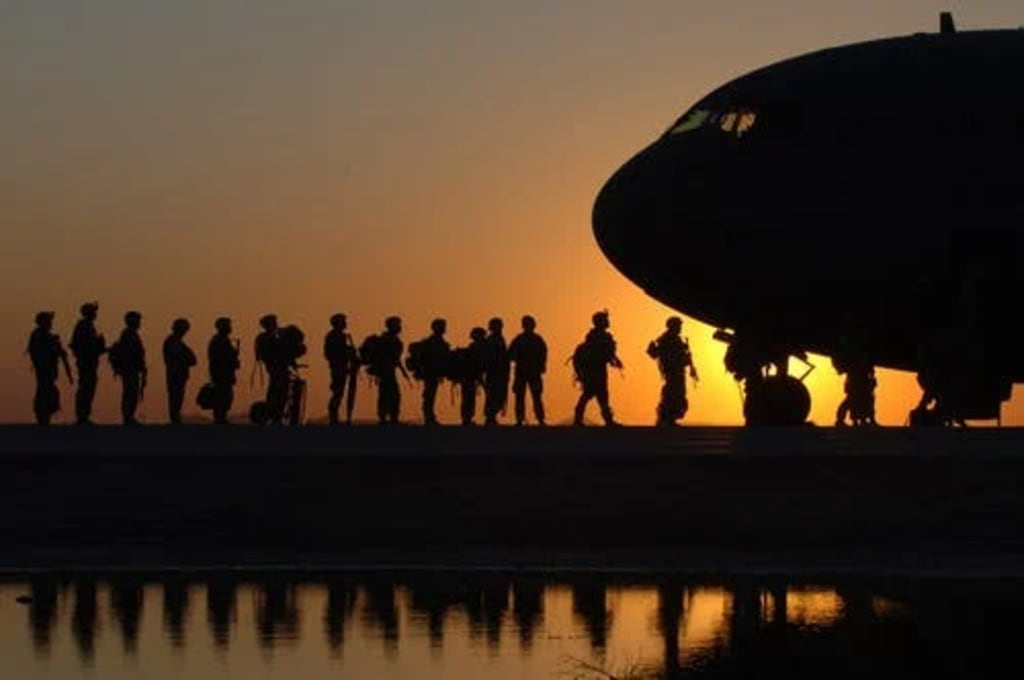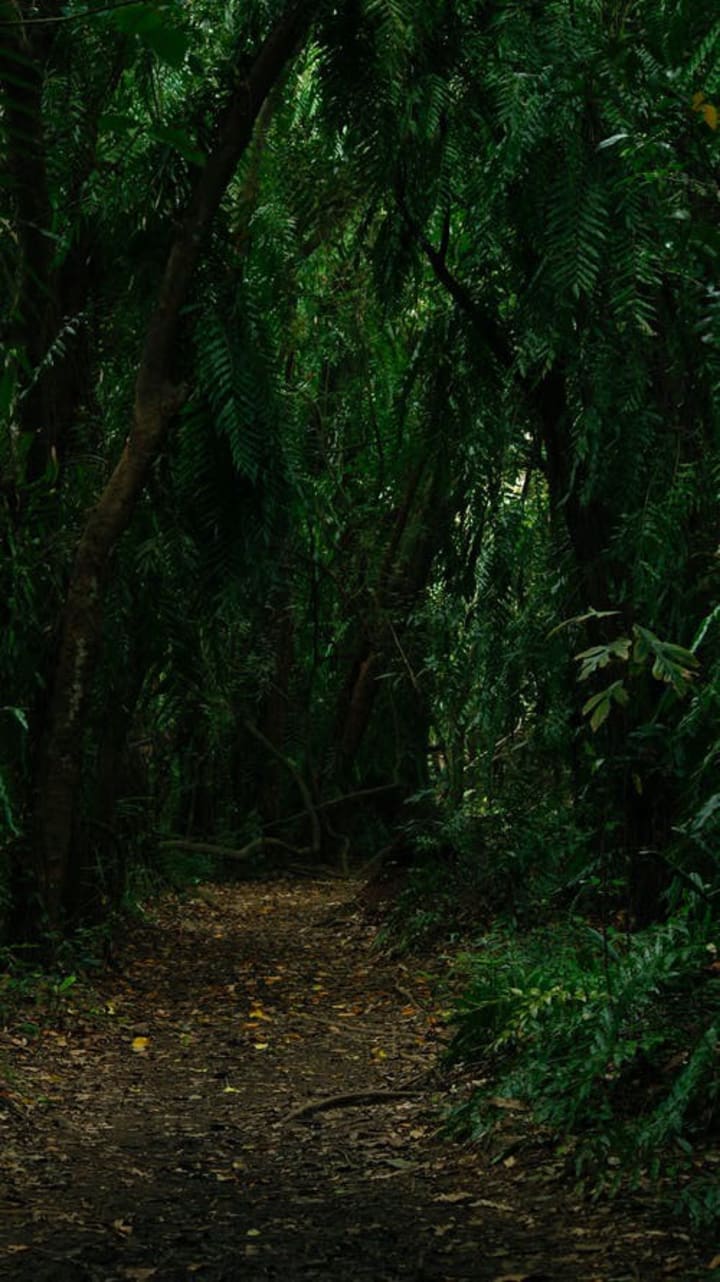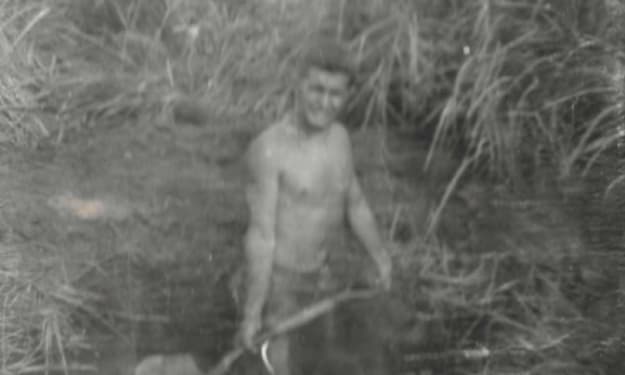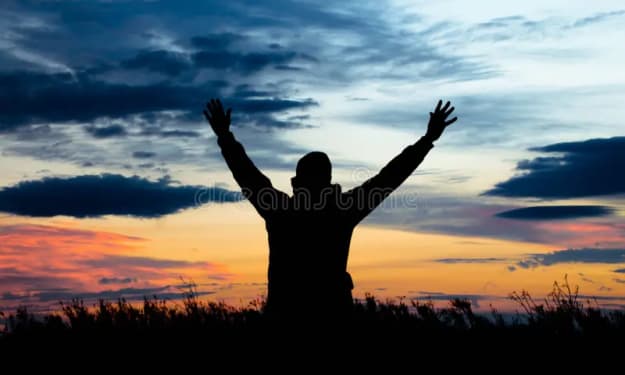
I arrived in Vietnam on February 17th, 1967. It was a sunny, humid, upper-nineties day. The NCOIC (non-commissioned officer in charge) shouted above the aircraft’s engine. “Get your asses off the plane, grab your duffel bag, and double-time it to the hangar. Now, dammit!”
As soon as we disembarked from the comfort of the huge, air-conditioned bird that had flown us here, every one of us started sweating profusely. Soon after, our fatigue shirts were drenched. The dry heat had absorbed the coolness of our fatigues, and like a mighty vacuum, sucked the moisture from our bodies.
Waiting for us there, in the shade of the hangar, were buses, adorned with jail bars on all the windows. The bars were used to prevent the enemy from lobbing hand grenades into the bus. Each side of the bus was draped with concertina wire, to dissuade hangers-on. Kids were used to troops busing back and forth from Saigon to Bien Hoa, where there was a large military base. They would run beside the bus, or peddle their bikes, pleading for chocolate bars.
It was there, in the hangar, where we learned, en masse, we had been assigned to the 173rd Airborne Brigade (Separate). We would have to wait until we arrived at our base camp in Bien Hoa to find out which Battalion was selected for us.
The bus route was herky-jerky slow while we traversed through the middle of Saigon. There were no traffic lights, and the streets were filled with mopeds, bicycles, and motorcycles, but the absence of cars surprised me. It was chaotic, but the bus driver maneuvered around the traffic as if he had done it a million times. Once we hit the outskirts of the city, traffic cleared and we made the rest of the 16 miles to Bien Hoa without further commotion.
We double-timed off the bus and into a platoon formation, where we waited for our unit assignments. A Non-Com (non-commissioned officer) hollered out roll-call and announced our unit assignment. One by one, as each man’s name was called, he left formation and fell in with his new unit.
When it was my turn, the First Sergeant-in-charge awkwardly hollered “Kouse? Ky-oose? It didn’t sound like my name, so I didn’t answer. Then, he spelled it out, “K-a-y-s-e”?
“Here, First Sergeant”, I promptly replied.
He asked, “How the hell you pronounce that, son”?
“Like the plural of K, Ks, First Sergeant”.
“Okay, A Company, First Bat”. Then he continued to blurt out names until the original formation was emptied.
Now that we had our unit assignments, we had to be supplied with the necessities: Two sets of fatigues, socks, underwear, belt, dental supplies, shoes — the whole nine yards! Next, we went to the Armory and picked up our rifles, and ammo supplies. That included an ammo belt with first aid bandages, extra ammo clips, two grenades, and a water canteen.
After all our supplies had been procured, we were directed to our platoons, and then the leader of each platoon placed us with our specific squad. I was placed in “Lima” or L Platoon. Lt. Jones, my platoon leader, assigned me to A (“Alpha”) Squad. Each squad had a non-commissioned officer, usually an E-5 or higher rank, plus 8 more “grunts” which normally were divided into two separate fire teams of 4 men each.
This Army structure system was new to me, but it was very important to remember — so you knew who your team members were and, for identification purposes in case things went awry. Wounded and dead had toe tags for a reason.
After a few days, my brain was stuffed with new info. I was still acclimating to the heat, and I was catching on pretty fast to what I was being “field taught” every day. That teaching style was strictly “learn by the seat of your pants in the boonies.” I quickly remembered all the acceptable shortcuts and tricks my teammates were throwing at me because they were quick to chasten me if I did something wrong. After all, our lives depended on each man’s contribution.
“Pack each magazine with 18 bullets, not 20. Packing the full amount jams the magazine and you don’t want that if you’re in a firefight with “charlie”.”
“Don’t skip taking your salt pill.”
“Always treat water taken from any water source like a lake, stream, creek, or river with an iodine tablet.” It disinfects the water of parasites.
“Don’t worry about the mortar rounds you hear whistling overhead. They won’t hurt you!”
“Worry about the rounds you can’t hear!” “Listen for the “ploof” of the mortar tube.”
“Never carry C-4 plastique and demo caps together, unless you want to meet God real quick.”
C-4 is a plastic explosive material that is docile until you stick a demo cap in it. You needed a blasting cap to make it explode. When inserted into the C-4, it became a very deadly bomb.
Ironically, because of its innate character, you could tear off a small piece, light it and cook with it. It burned nearly as hot as an acetylene torch. It was ideal for cooking because no wood was needed and as it burned it left a faint smoke trail. It was also easily extinguished, so we routinely used it to cook our C-rations or make coffee or hot chocolate.
One Month Down, Eleven to Go!
My first month of in-country duty went by quickly and with few enemy incidents. My platoon and I would be sent on “Search and Destroy” missions around the outskirts of Saigon. The south was inundated with Viet Cong, northern sympathizers who would constantly test our base perimeter and other high-value targets, such as the airstrip. My platoon had been sent on several of these missions, but we had few encounters with the Viet Cong, mostly “one-off” skirmishes, where we would capture or detain someone suspected of being V.C.
It was during one of these first missions each squad member was asked to draw a straw. Our RTO (Radio Transmit Operator) was a short-timer (had less than a month left of his tour of duty) and would no longer be joining us on our missions. I grabbed a straw and saw it was pretty long, but I didn’t know if that was good or bad. As it turned out, it was bad! I had just been chosen to replace the short-timer as the new radio operator.
Along with my regular gear and ammo, now I had to tote around a 25-pound radio, along with two spare batteries and I took up a new position in the squad, next to the squad leader. I had been assigned to the last group of 4 men in our squad. That had been fine with me, as it kept me from having to walk the point, a very treacherous position for any squad member. They would lead us into enemy territory and tended to be targeted first!
The second most heavily targeted squad member was the RTO! “Charlie” knew, if he took out the radio operator, it would take away our ability to relay information to our commanders. In every firefight, the RTO was always a highly-coveted chess piece to remove from the board.
One of my squad members tried to re-name me. He suggested I was no more than an “attractive nuisance” to the enemy. He was trying to be funny, to distract me from the reality of the situation, but then he offered a valuable lesson, which I took to heart: “Keep your head down!”
March 18th, 1967.
On the afternoon of March 18th, I experienced my first taste of action with the enemy. We had an established practice of sending out ambush patrols each night. These were overnight forays into enemy territory, designed to surprise and attack the enemy when they were supposedly off-guard and highly vulnerable. This helped deter the enemy from probing our perimeter and gave us invaluable information about their strength, mode of transportation, and sources of resupply.
This late afternoon trek was new to me. I was assigned to my first ambush patrol. My squad was instructed to set up alongside a heavily trafficked trail. We left our base camp around 19:00 (7:00 p.m. civilian time). We had to travel through some pretty dense jungle to arrive at the ambush site on the trail before it got dark.
Darkness in the jungle is as deep as blindness — you can’t see your hand in front of your face. Luckily, we made it, just as dusk was setting in. We hurriedly booby-trapped the trail with claymore mines at each end of the kill zone. Next, we burrowed into some deep underbrush for cover which was growing by the trail and waited.
The jungle at night is eerily dark and the later it got, the darker it became! You literally and figuratively could not see your hand in front of your face. Any slight noise seemed to echo throughout the night. Because of our limited visibility, we had to rely mostly on sound to help us determine the enemy’s presence. We had wiped clean the trail in front of us with dead tree branches. If anyone tread on the trail, we would know by morning.
Activity picked up dramatically around 21:00. Although it was hard to see much more than a silhouette in these circumstances, we heard footsteps shuffling on the trail. We could tell it was a sizable unit of Viet Cong. We just couldn’t tell how many there were because the shuffling seemed continuous.
Suddenly, as the footsteps continued to our front, we noticed sounds coming from directly behind us, as well. “Charlie” had detached a squad to the left and right of the trail, as protection. He knew trails were ideal for ambushes and made a conscious decision to dissuade our attack, not realizing how close we were in proximity.
The footsteps to our rear became more pronounced as if they were right on top of us. They were so close, we each had to draw our feet into a fetal position. It would mean certain death if any enemy soldiers had inadvertently stepped on us. It was a terrifying experience for all of us — one that would not be forgotten.
Using hand signals, our Sergeant relayed two commands up and down our line: Do not fire! Do not blow the claymore mines! All we could do is lay there, frozen in fear. Any other action would be pure suicide.
Eventually, the footsteps subsided and we each released a huge, inaudible sigh of relief. We all knew how close we had come to being exposed and killed. I don’t know about the rest of my squad, but I, for one, said a prayer of thanks to God for having let me survive.
The rest of our shift in the boonies was spent in silence. Death had breathed on us, but let us live. At the dawn of the next morning, we arose from our nest in the underbrush and checked out the trail. It was pocked with footprints everywhere. We estimated an element of perhaps 250 men had passed by us during the night. The only sign they had left was their footprints. There was no clinking or clanging of their gear, no discarded food or other trash, just those footprints — those and an occasional broken branch from a shrub littered in back of us.
We made it back to our Company command post and “Sarge” gave his report. We had provided our C.O. with enough new intelligence for him to send it up the chain of command to our Battalion Commander. In turn, he sent out a Search and Destroy team of Bravo Company and Delta Company to seek out the enemy and take care of business.
* * *
April 11th, 1967.
Enemy activity surrounding our position was picking up. My Platoon was sent on a Search and Destroy mission about 2 klicks (2,000 meters) outside our base perimeter. Our FOP (Forward Observation Post) scouts had found enemy activity and directed us to their exact map location.

As we arrived at the enemy’s camp, we could see empty foxholes all around us. There was also a small fire with a canteen cup filled with rice, and it was still cooking. We knew they had made a hasty retreat.
They must have heard us rustling through the dense jungle. Their personal belongings were strewn all about the camp, so they had to be nearby.
We were searching the immediate area when, suddenly, gunfire erupted and all hell broke loose. We started receiving enemy fire from our left and to our front. So, we spread out and returned fire. The firefight seemed to last forever but was over in less than half an hour.
During the firefight, I started receiving fire in front of me, and from a tree to my left. There was an enemy foxhole to the front of me. My CO had jumped in there to establish a safe field of fire. While he was crouched at the bottom of the hole, I felt myself being pulled into the foxhole as well.
I even remember having the presence of mind to smile and say thanks to the invisible force that had helped me. No, I wasn’t hallucinating … this did indeed happen. Not knowing the “how” or “why” it happened, I can only thank God for keeping me safe.
I didn’t have time to examine this moment during the heat of battle. Bullets were spraying the ground all around me, which made it difficult to pinpoint the exact location of the firing, until I saw tree limbs shaking. Then I saw a dull object start to poke out from those limbs and knew it was an enemy soldier getting ready to fire off more rounds at me.
I waited for him to poke out enough to get a real good target on him and fired off several rounds. They had found their mark and the shooting stopped as abruptly as it had started.
My CO and I got up and hustled over to the tree where the firing had come, some 50 meters away. When we got there, to our right was a well-worn trail several of our platoon members had gone down, to ferret out any remaining enemy.
I looked down the length of the trail and saw a soldier dragging a body and calling for help. I immediately ran to assist him and realized we were dragging a dead body back to the camp area. He told me there were two more men further down the trail and we both went to drag another dead body back. When we got the second dead man back to our position, more of our platoon members arrived behind us, carrying the third body. Thankfully, he was still alive. The two dead men had been shot in the back, and the wounded man was shot in the stomach as he turned to target where the firing was coming from.
By the time we made makeshift ‘stretchers’ out of our ponchos to carry the dead and wounded, it was nearing sundown. We had volunteers to carry the men but had to stop frequently to switch carriers, due to the weight of each man and his equipment.
The trek back to our base camp was arduous. All along the path, we could hear each other trying to cry silently. Occasionally, we sprayed bullets to our sides and rear, to make sure “Charlie” wasn’t following us. By the time we reached camp, every one of us was drained and we collapsed to the ground.
I have never forgotten the details of that day because it was my first real taste of death in war. One of the men who died that day was a Staff Sergeant platoon leader. The other was a private, the platoon leader’s RTO. He had been in-country less than a month when he was killed
When we left the enemy’s camp, no one had taken “Charlie” out of the tree. Who would take him down? How would they get him home? Was he married? Did he have a family? So many questions started swirling around in my head. I never got answers to any of those and they are ever-present with me.
In war, death is never pretty!
Back in the 1980s, I went to quite a few group counseling sessions at the local “Vet Center,” which had more of a social work feeling to it, since there was no direct, one-on-one counseling held. We would all lie to each other about how “great” we were doing.
I spent 8 years in that environment. For the first six months or so, we went on Tuesdays and Thursdays. Many times my wife would join along, to corroborate what I was going through.
I made very little progress during that time. After so much stationary pedaling, we looked at each other and agreed it was time to move on to something better. I paused treatment for an extended period, trying to manage my Post-Traumatic Stress on my own.
Next, I sought counseling from a professional outside the VA healthcare system. My brother-in-law referred him to me and he was very thorough, but I had to start from scratch.
He recommended I take part in the Outward Bound experience, in Colorado. It was a 2-week Alpine mountaineering exposure course, designed to help me reconcile my differences with Mother Nature (I don’t camp well.) Trekking up and down mountain passes and through thickets was not good for me. It triggered too many memories.
When I returned home, I knew that didn’t answer what was troubling me, so I started looking for a different answer. Besides, in that time I wasn’t making much money and he wasn’t cheap!
So, I changed counselors and went back to the VA, with the stipulation they put me with someone on a one-on-one basis, which they obliged.
For a third time, I had to start over. I had to fill in the dots for each counselor so they could give me an accurate assessment and assign the proper mood medicines. They made sure none of these new meds conflicted with any other medication I had to take for a variety of other conditions.
Now deep into the 2000s, starting all over with another counselor wasn’t going to work. I needed someone to probe me on a deeper level, deeper than anyone I had previously seen.
That’s when I met Dr. K! I haven’t seen her for quite some time and haven’t found a way to contact her so, I can’t ask her for permission to use her name, so I’ll leave it at that — Dr. K.
Slowly, but surely, she deftly tore down the wall I had built around myself. She had a smooth style where she would ask probing questions in a non-threatening way. She was attentive to even the smallest details I might throw out and watched my mannerisms as I relived so much of what I had been through.
She was the first psychologist, ever, to help me piece together the events of that day in April, and how I felt about them. I never could get through all the actions of that day without crying, and she understood.

It seems I have deep remorse for my actions, even though I was in a “Kill or be killed” situation. Methodically, she stripped my actions that day into minutes, then moments, and helped me understand why there was need for my actions.
She suggested I write a letter to the “soldier in the tree,” in the hope that it would release me from whatever most upsets me. I took her advice and wrote him a letter on 12/17/10. I offer it to you now:
“Dear Soldier,
So, here we are again! I have thought of you and your family frequently over all these years. I know nothing about you! I don’t know what you looked like, because I never got to see your face after I shot you. I don’t know if you were young or old. I don’t know if you had a wife or children. And, perhaps it is best I shouldn’t know these things. Still, I can’t help feeling as though I robbed your family of being able to grow old with you.
I feel we are both victims of the circumstances we found thrust upon us. I am sure you must have been as scared of me as I was of you. At the time, we were both fighting for our respective countries, a very honorable task. Unfortunately, it is you who paid the ultimate sacrifice for your service.
I am sorry I took your life from you. It was either you, or me, and I wanted to stop you from hurting anyone else. If I could go back in time, to that day, and change things, I definitely would. But, in war, there is no such thing as a “do-over!”
In my mind, all these years I have believed that you were the one who killed two of our soldiers and wounded a third. But, I can’t prove it, and because I can’t, I’ve often asked myself why it matters anyway. Dead is dead and nothing I say, think, or do will ever change that.
As you know, in the heat of battle, your actions are instinctive. I didn’t have time to think about the repercussions of my actions until many years after I had committed them. I just want you to know that it was your actions that caused my reactions. I have no shame or guilt for taking your life. If anything, I wish I could have found you sooner! If I had, maybe the others would still be alive. But then, that’s just conjecture, isn’t it?
As I have no shame, neither do I take any pride in what I did. I am simply glad to be alive. I faced many more of your comrades over the year I was there and was able to survive. I have remorse within me for having hurt you. I want you to know I’ve tried to live the rest of my life without harming anyone else.
Throughout my life, as I have remembered and carried your two victims, so have I carried you. I will never, ever forget you, but, I must stop letting you impact my memories and my life with my loved ones from this moment on!
May you rest in peace!”
Thanks for reading this!






Comments
There are no comments for this story
Be the first to respond and start the conversation.